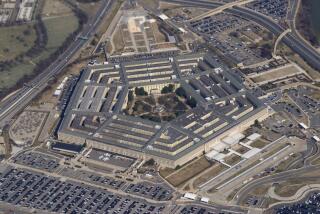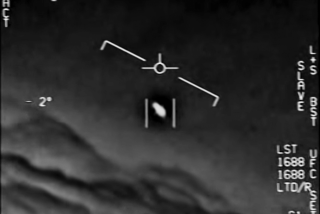U.S. Feared Soviets Might Exploit UFO Sightings
- Share via
WASHINGTON — U.S. officials worried during the Cold War that the Soviets might try to disrupt America’s air defense system or the government itself by orchestrating mass UFO sightings, says a historian who scrutinized CIA documents of the period.
Such concern prompted the Air Force and others to play down the UFO issue during the 1950s and to concoct false cover stories to explain sightings of alleged “flying saucers” that were super-secret U.S. spy planes, according to an article last spring in a CIA journal.
The article by historian Gerald K. Haines said a CIA special study group worried in 1952 that “the Soviets could use UFO sightings to touch off mass hysteria and panic in the United States.”
He said the U.S. spy agency also was concerned about the possibility that hysteria over UFO sightings might “overload the U.S. air warning system, so that it could not distinguish real [military] targets from phantom UFOs” and provide the Soviets an advantage for a surprise attack.
He said a special panel studying the issue concluded that “potential enemies contemplating an attack on the United States might exploit the UFO phenomena and use them to disrupt U.S. air defenses,” Haines wrote.
The article, titled “CIA’s Role in the Study of UFOs, 1947-90,” was published in the spring issue of Studies of Intelligence, a CIA journal. An unclassified version appeared recently on the Internet.
Haines is a historian at the National Reconnaissance Office, which monitors and interprets data from intelligence satellites.
He wrote that concerns about hysteria over alleged UFO sightings prompted the CIA to create a special outside scientific panel in 1953 to look into the security implications.
The panel, headed by Cal Tech physicist H.P. Robertson, concluded unanimously that there was no credible evidence of UFOs from outer space or evidence of a direct national-security threat.
But the panel “did find that continued emphasis on UFO reporting might threaten the orderly functioning of the government by clogging the channels of communication with irrelevant reports and by inducing hysterical mass behavior harmful to constituted authority,” Haines wrote.
Before disbanding, the panel recommended that the National Security Council “debunk UFO reports and institute a policy of public education to reassure the public of the lack of evidence behind UFOs.”
It also urged the use of the mass media, advertising, business clubs and “even the Disney Corp. to get the message across,” wrote Haines. The article gave no indication what involvement had been suggested for the Disney entertainment organization.
By 1956, the Air Force was able to attribute 96% of all UFO sightings to the high-altitude U-2 and SR-71 intelligence-gathering planes, Haines said. But it took care “not to reveal the true cause of the sightings to the public,” linking them instead to “natural phenomena, such as ice crystals and temperature inversions.”
More to Read
Sign up for Essential California
The most important California stories and recommendations in your inbox every morning.
You may occasionally receive promotional content from the Los Angeles Times.













